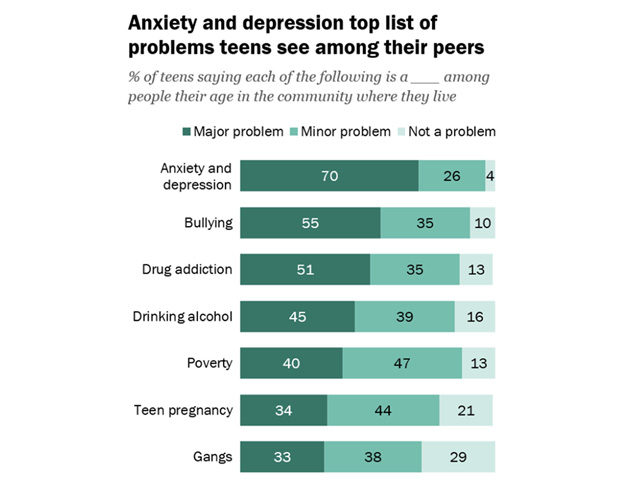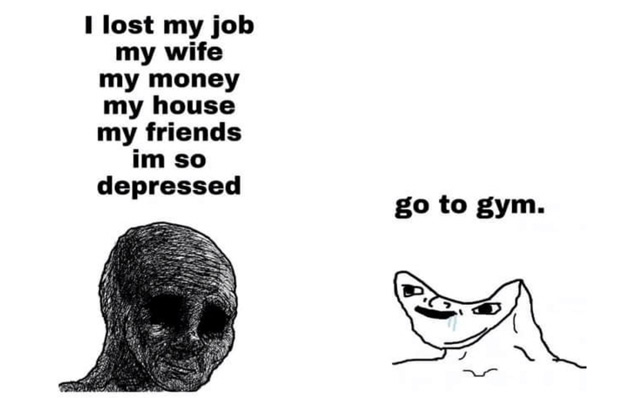Sharing Memes of Mental Struggles
Here to share more relatable memes to my sad little pumpkin seeds 🎃 have you ever felt this way, or is just most people? #depression #BPD #memes #mentalhealth #depressionmemes pic.twitter.com/x1iBGoZmEe
— Un-aliveing Pumpkin (@UA_Pupkin) November 5, 2021
By Ryan Pullido
Discussing mental health is common for members of Generation Z, despite it being taboo in older generations. Gen Zers are generally defined as those born between 1997 and 2012, according to Pew Research. A Pew Research survey of teens between age 13 and 17 in 2018 found that seven in 10 feel anxiety and depression are a major problem. “Concern about mental health cuts across gender, racial and socio-economic lines, with roughly equal shares of teens across demographic groups saying it is a significant issue in their community,” said researchers.

One way young people address their struggles with mental stressors is through memes which have created communities across the internet. Student Alaina Valena, 17, says she sends memes that she finds relatable on social media platforms such as TikTok and Instagram to her friends as a way to alleviate stress and to “laugh it off.” She also adds that she uses humor as a coping mechanism in moments of dark times.
One community is r/wholesomememes, aka “Internet for the Spirit,” on Reddit, which has 13.3 million members, often discuss mental health.
Another active community r/adhdmemes has 461,000 members and cites among its rules “Be nice” and “ADHD is real.”
On Twitter, @WholesomeMemes has 3 million followers. The account owners explain, “We post memes, comics, wholesome stuff & anything we like.”
Comic by @elclimo pic.twitter.com/1n16jX8x4n
— WholesomeMemes (@WholesomeMeme) February 4, 2023
A Twitter hashtag, #depressionmemes also offers a space for users to commiserate.
Living in a family that does not understand your mental health struggles is real pain😅#mentalhealth #Memes #SuicidePrevention #SuicideAwareness #depression #depressionmemes #FamilyTherapy pic.twitter.com/kSelPSBwwW
— I am Ears (@Iamears2) February 10, 2022
Gen Z’s constant online presence has some dubbing them the “loneliest generation.” Members’ relationship with technology may be due to the stressors that they face in their daily lives, according to the American Psychological Association (APA). In its twelfth annual report, “Stress in America,” the APA found that Gen Z is the most stressed group and “most likely of all generations to report poor mental health.” The survey found that “Gen Z is significantly more likely to report their mental health as fair or poor, with 27 percent saying this is the case.” This compared to 15% for Millennials, 13% for Gen Xers, 7% for Boomers and 5% for older adults.
What are they stressed about? According to this survey: current events, climate change, uncertain futures, social anxiety and relationships.
Traumatic events such as the ever-increasing number mass shootings in the country contribute to the daily stresses of Gen Zers. According to the APA survey, 75% were stressed about mass shootings compared to 62% of adults overall. In addition, 58% of Gen Z are stressed about climate change and global warming compared to 51% of adults overall.
Depression
Young people are worried about their futures. Memes like “would you?” posted on the subreddit r/depressive_memes reflect this preoccupation.
The meme garnered a lot of engagement with 262 comments and 2,297 k upvotes. One user by the name of u/deadmanredditting commented on their own story and the things that they went through. “10 years ago if I’d followed through I would have never seen Avengers Endgame. I wouldn’t have experienced some cool af VR games like beatsaber. I wouldn’t have met my wife.”
However, other comments in the thread questioned why life is worth living. User u/GamerGranville stated, “And I wouldn’t have to be living in pain anymore. I wouldn’t be exhausted and jittery from copious amounts of caffeine and stimulants to stay alert and keep working.” Despite the pessimistic view of life, u/deadmanredditting continued to give support to his fellow Redditor commenting, “The least anyone can do is give support, and offer to appreciate life with them along the way. Because this existence isn’t the same without the people we meet along the way.” A bot also lists suicide hotlines not just in the United States but globally.
Another meme that was posted on the subreddit r/meirl also tackled depression, oversimplifing the complication of a mental illness such as depression.

The meme garnered over 441 comments and 4941 upvotes. Comments range from snarky jokes about the meme to opposing views. Expanding upon the meme’s flip advice, some explained how exercise had helped them tremendously with depression. User u/brookeslegit2 wrote, “Take it from someone who works at a gym front desk, invariably they come in pissed off and not in the mood, when they’re done it’s night and day and they want to talk to you for hours. As someone who hated exercise growing up it’s truly beautiful to see its effect on people.” The comment sparked conversation, receiving more than 258 upvotes and 10 replies, with others commenting about their own experience and stories.
Social Anxiety
Another meme titled Social Anxiety Meeting discusses the stress it causes while also poking light fun.
The meme is IGdoods comic characters that features cute birds. The color of the birds and the background are warm, inviting users to chime in. In the comments, many users share their own experiences of living with social anxiety. One user u/Mortlach78 commented, “I actually have/had social anxiety and I actually did attend group therapy for that. I still find the irony hilarious. But…If anyone struggles with this, it does work. We tend to think our mental health issues are somehow special or unique, but they’re not…they have a treatment protocol with like a 95% success chance or something. So please don’t let the idea of group therapy stop you from seeking treatment.”
The comment received over 327 upvotes and more than 50 replies continuing the conversation. Some had pleasant experiences while others, such as u/louisbrunet, did not. “It’s really not made for everybody, especially if you are in a situation too far from the rest of the group. In my case, my anxiety is very much linked to my autism diagnostic [sic] and I didn’t feel understood at all.”
Relationships
Another worry for Gen Zers is relationships because some have trouble finding and connecting with other people in person. This can result in them seeing their favorite streamers as their friends. They confide in them and tell them their secrets. This one-sided relationship is a parasocial one. Researchers in “Parasocial Interactions and Relationships in Early Adolescence,” explain that these are “one-sided connections imagined with celebrities and media figures, are common in adolescence and might play a role in adolescent identity formation and autonomy development.” A meme in the subreddit r/jschlatt, dedicated to the popular streamer Jschlatt, discusses this phenomenon. It had 4,960 upvotes and 54 comments.
The meme sparked a conversation discussing the dangers of parasocial relationships. A user by the name of u/Spar-kie commented, “I appreciate Schlatt for doing this. It hurts to hear initially, that someone who you respect and look up to doesn’t care about you as a person, not out of malice, but just because of the reality of how being well-known works.”
Therapist Donna Tubig says that memes have a positive impact on mental health. “I think memes just help others cope in a way where it’s both humorous and relatable,” said Tubig. “[It] can be used to cope since they know their problems are also similar to others, therefore making it effective.”
Memes are not just funny pictures on the internet. They help begin conversations that some may not be able to have with others in real life. The anonymity of the internet has provided everyone a space to freely express themselves and their troubles. As the old saying goes, “misery loves company.”
Saved under Featured Slide, Health, News
